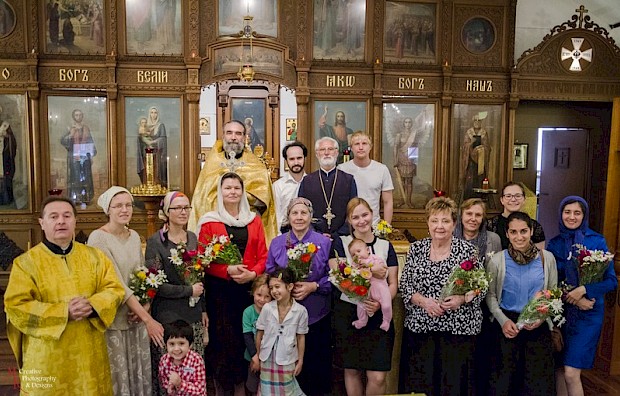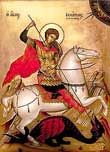St.George Russian Orthodox Church
Choir Feast 2016

On October 9, 2016, the Divine Liturgy was celebrated in our Temple on the occasion of the feast of Saint Romanos the Melodist, who is the heavenly patron of singers, and this day is celebrated as the feast of our church choir.
St. Romanos was born in Syria in the fifth century. His parents were neither rich nor famous but they were good Christians and loving parents. Romanos grew up with love for God in his heart. When he grew old enough he became an altar boy and then a singer and reader in church - at first in his hometown of Beirut and later in Constantinople. Romanos wanted to serve God to the best of his ability; he prayed a great deal; and was the first to come to Church and the last to leave. He lit the vigil lights with great reverence for he loved the saints before whose images they burned. Most of all he liked the church choir and was always happy when he was allowed to sing.
In those days the service of Matins, celebrated on feast days was very different from what it is now. During the service, psalms and verses from the Old Testament were chanted and then a singer stepped out into the middle of the church and sang a hymn called a "kontakion" which was much longer than the kontakions we sing today and explained the meaning of the event celebrated by the feast. Very often these singers improvised, that is to say, they thought up the words as they sang them and the faithful in the church would chant the response. Of course, good singers were very much appreciated, for they had to be good musicians, as well as talented and well educated to be able to improvise such hymns. It was an honoured position.
The Bishop of Constantinople became very fond of the new young singer Romanos. He saw his good life and how devoted he was to his service in church. Very soon he made Romanos one of the official readers and singers of the greatest church in Constantinople - Hagia Sophia (Holy Wisdom). The other singers did not like this at all. They were very proud of their voices and of their ability to compose hymns and they resented that an inexperienced newcomer like Romanos was singing like them.
Christmas was drawing near and the great church of Hagia Sophia opened her doors to crowds of worshipers. On Christmas Eve, especially, Vespers were celebrated very solemnly, for the Emperor and his court were in church. The Patriarch himself officiated. When the time came for a singer to come out and sing his Christmas hymn, the jealous readers suddenly pushed Romanos to the center of the Cathedral. "If you are good enough to be an official singer," they said teasingly, "Go out now and do as we do - sing an appropriate hymn."
Romanos felt paralyzed. Everyone was looking at him and waiting. His mouth went dry. Not a single thought came to his mind, not a sound to his lips. In the silence, the people waited smiling and whispering. At last, his eyes full of tears, Romanos escaped trying to hide behind the crowd of singers.
When the service had ended, Romanos remained alone for a long time in the dark and echoing cathedral. The fragrance of incense still filled the air and the vigil lights continued to glimmer in front of the icons. Romanos' eyes were drawn to the image of the Mother of our Lord. "Oh, gentle Mother," he prayed "help me, help me. My mind is empty, my lips are silent. How shall I glorify your new-born Son?"
Late that night Romanos returned home comforted by his long prayer and went to bed. While he slept he had a vision. The Mother of our Lord entered his room. She held in her hand a small scroll of paper and coming nearer to Romanos said very gently, " Open your lips." She then placed the paper in his mouth and ordered Romanos to swallow it. Romanos obeyed and immediately woke up. The room was empty, but his heart was full of great happiness and excitement while his mind was full of beautiful and sacred words.
It was Christmas morning and Romanos hurried to the Cathedral to attend Matins. As the moment came for a singer to step out and improvise a hymn, Romanos, without any hesitation, went forward. He was not afraid today; he did not hesitate to think. A beautiful melody burst from his lips and words that he had never heard before arranged themselves into sentences:
"Today the Virgin gives birth to the Transcendent One,
And the earth offers a cave to the unapproachable One;
Angles with shepherds glorify Him!
The wise men journey with the star,
Since, for our sake the eternal God was born as a little child!"
No one had every heard the prayer before, but it was so beautiful that the choir and entire congregation of the faithful took up the last words:
"Since, for our sake the eternal God was born as a little child!"
As soon as the service was over, the Patriarch hurried over and to Romanos and asked him who had taught him this wonderful hymn. Humbly, the young singer told of the miraculous vision and the gift he received.
Saint Romanos used his gift gratefully the rest of his life. He developed his God-given talent composing many beautiful hymns, and as you attend church services on major Holy Days, you may be sure that some of the prayers you hear were written by Saint Romanos.
